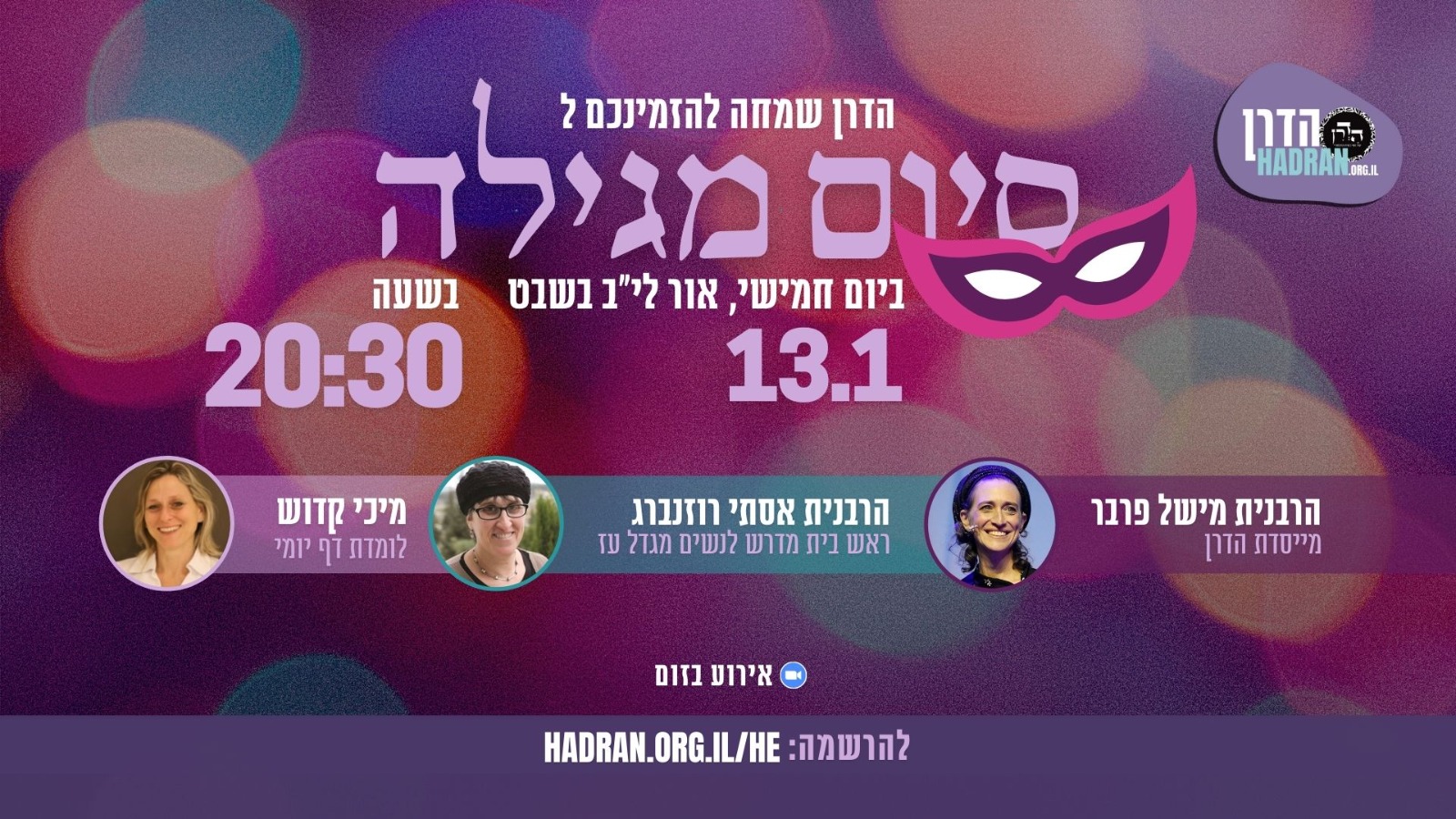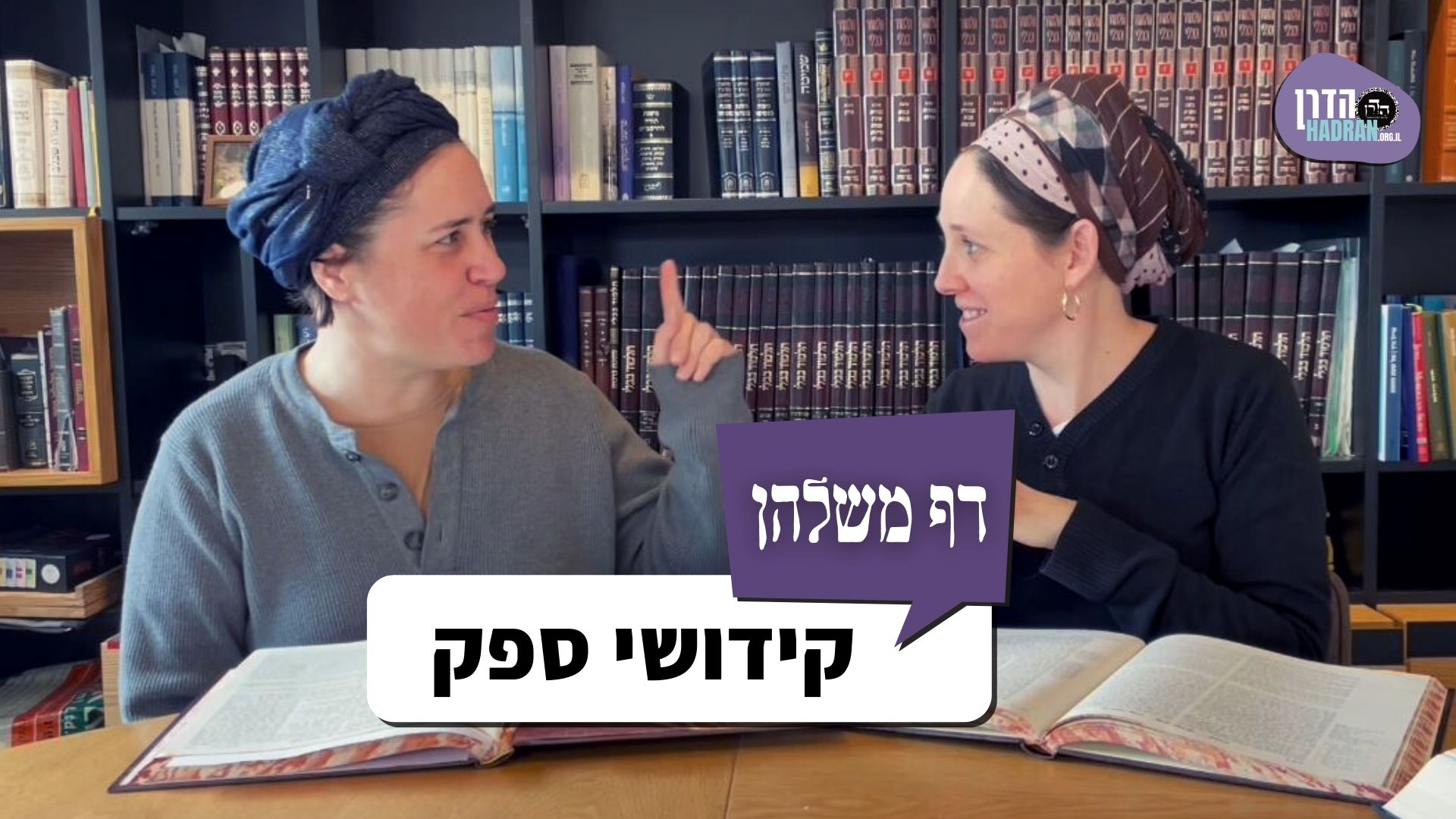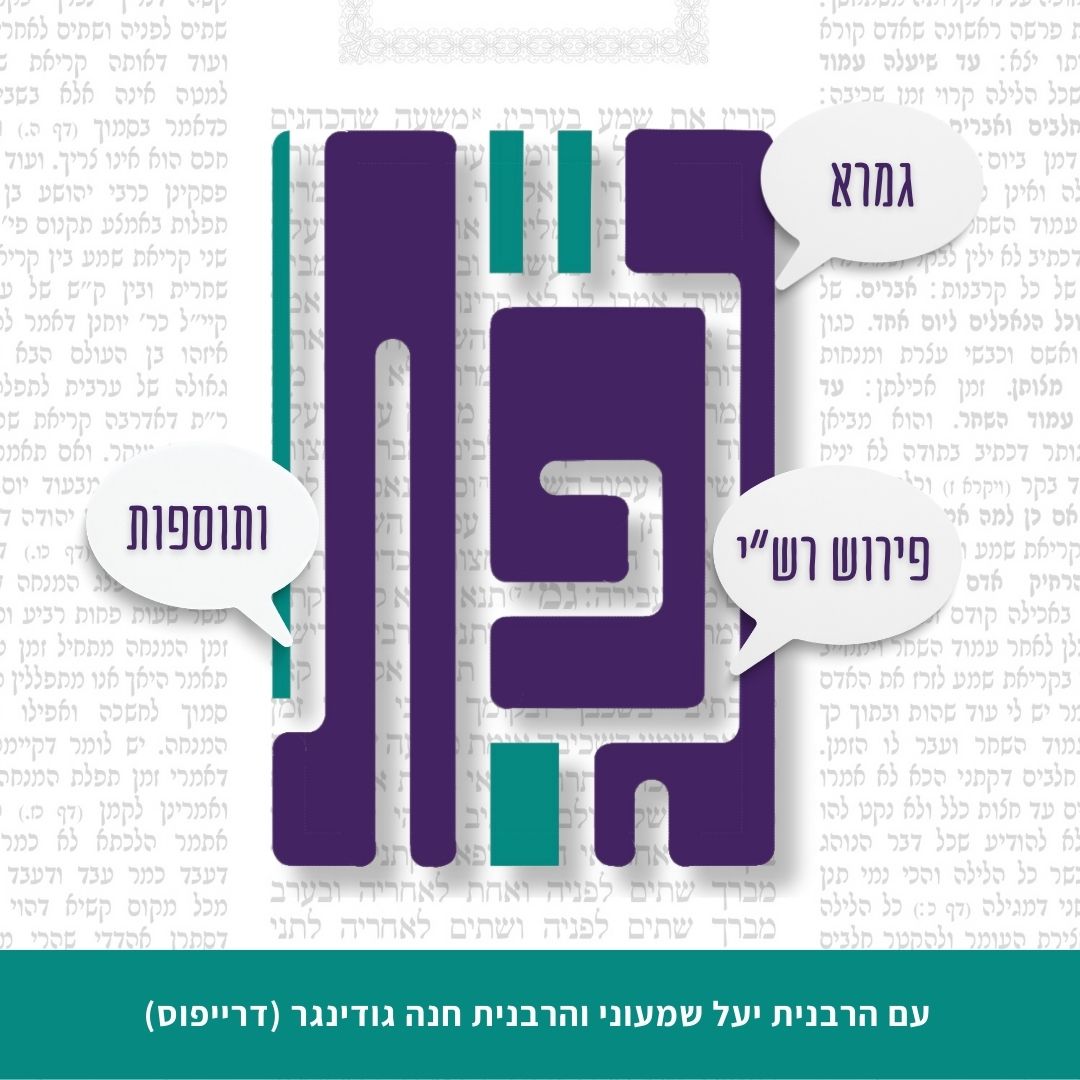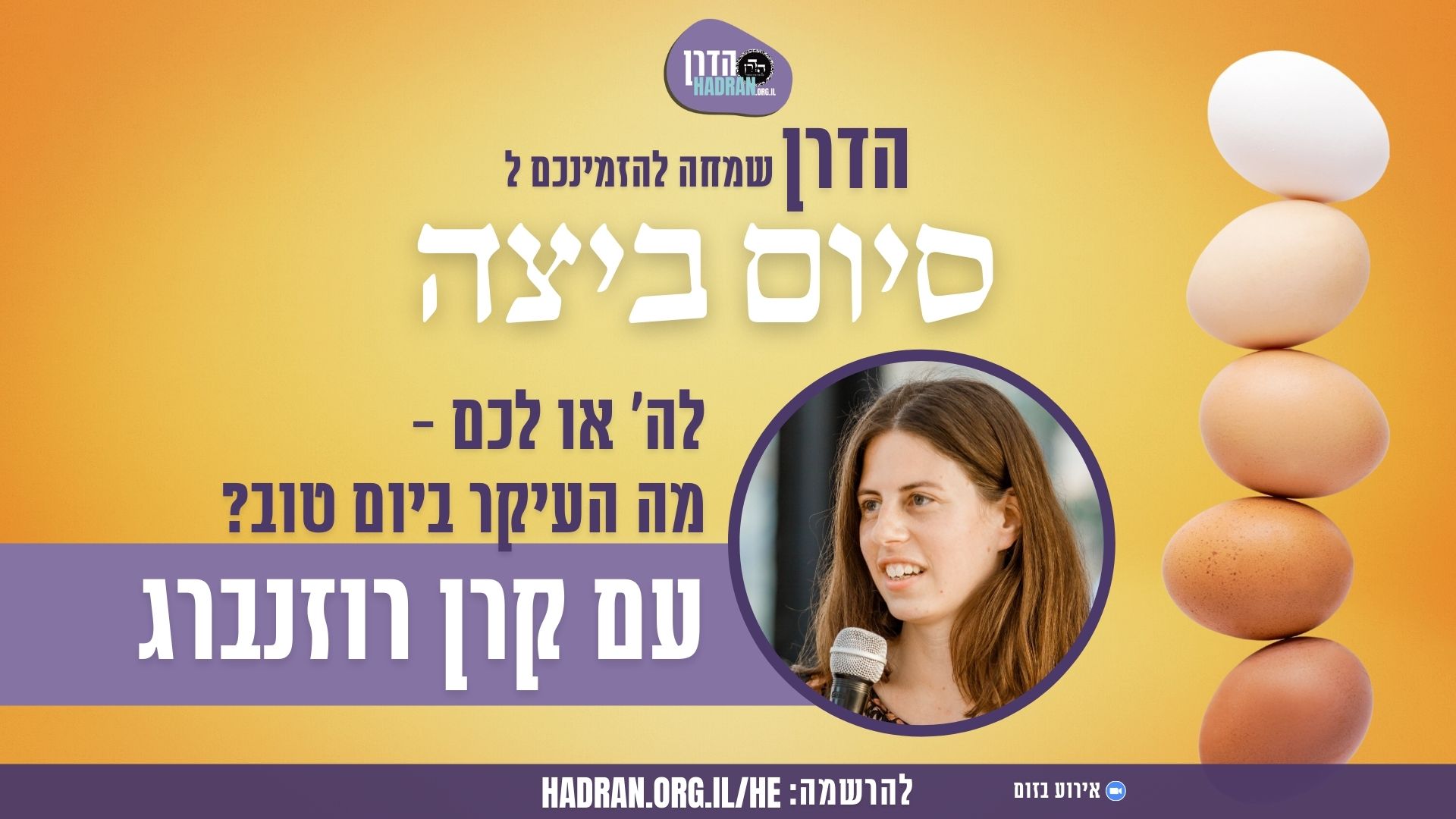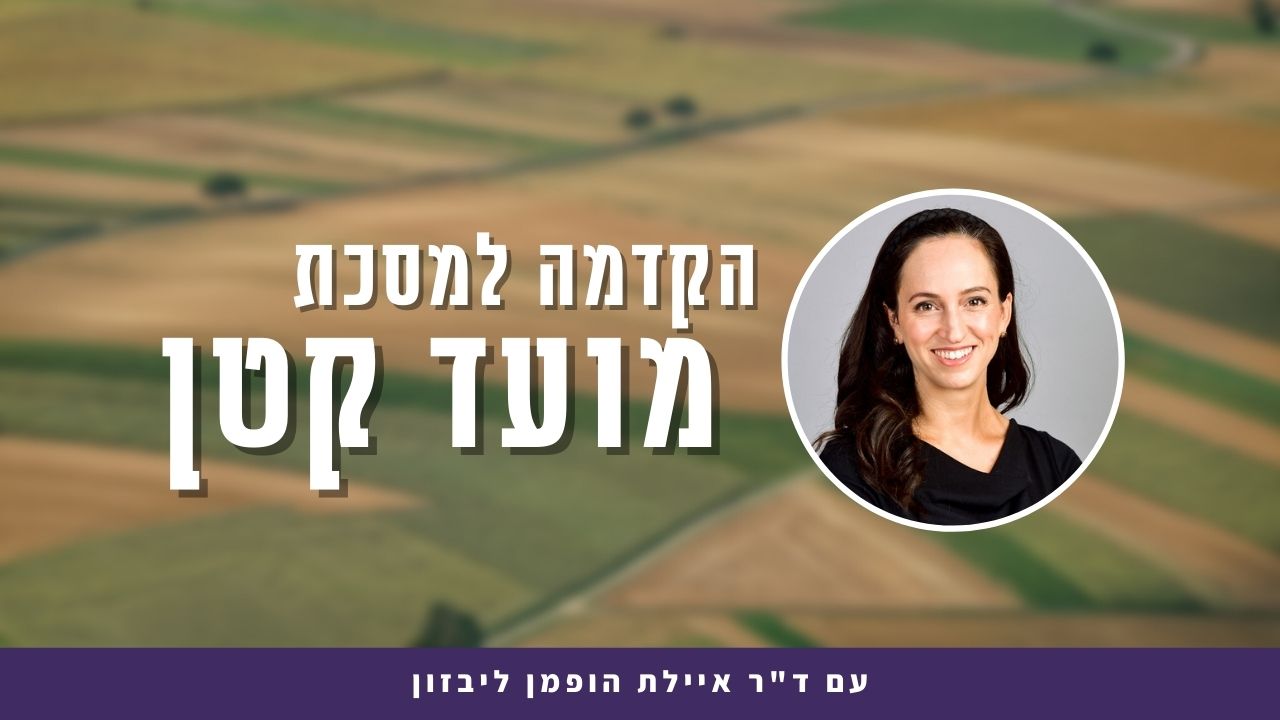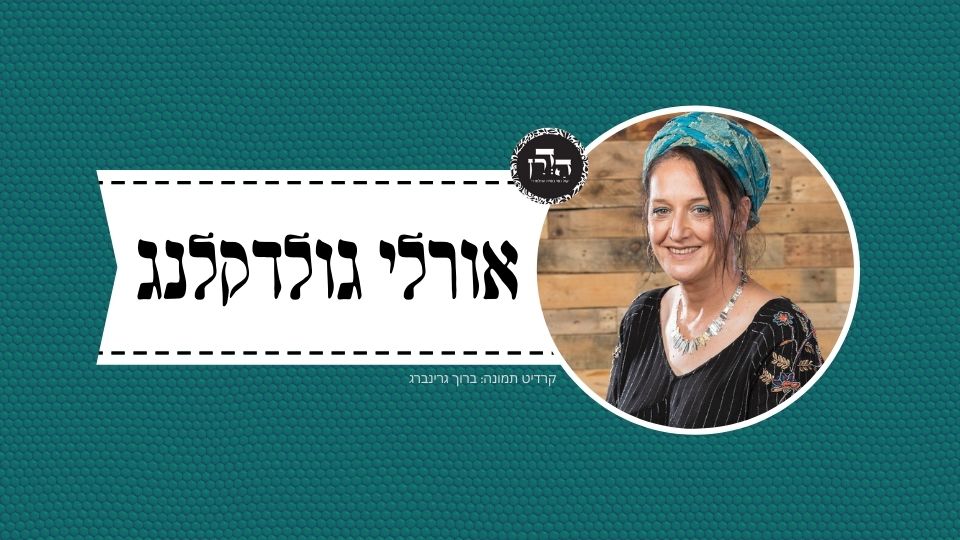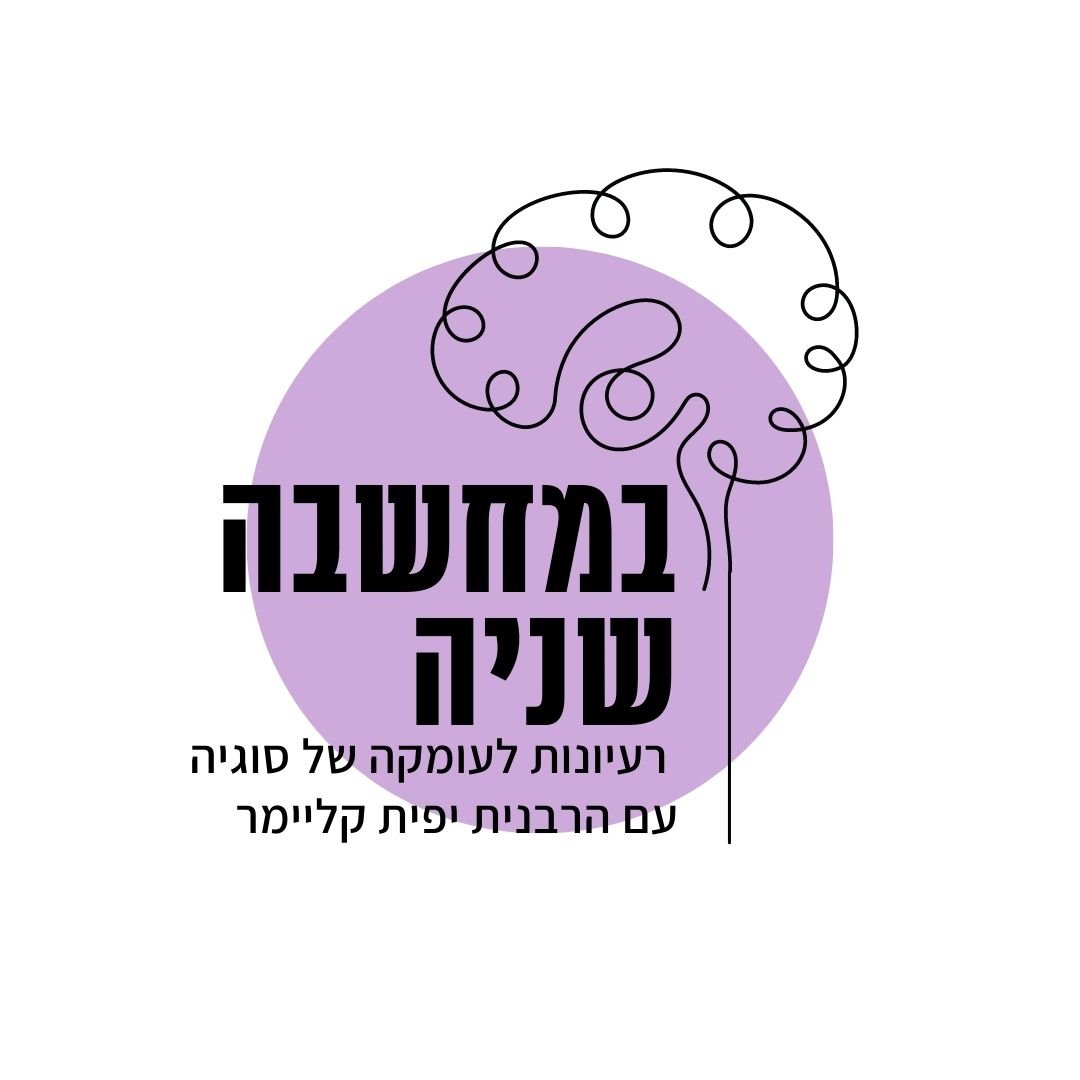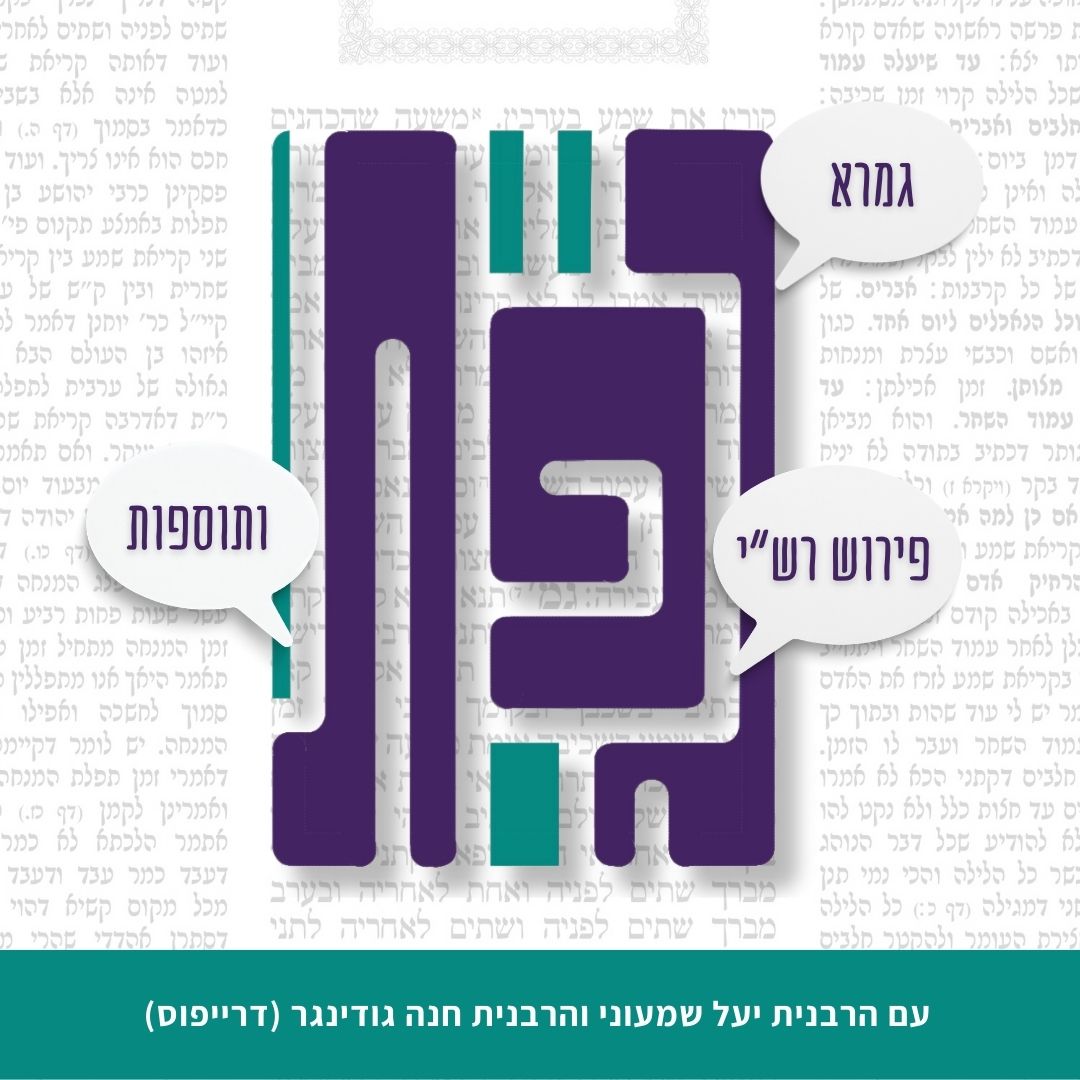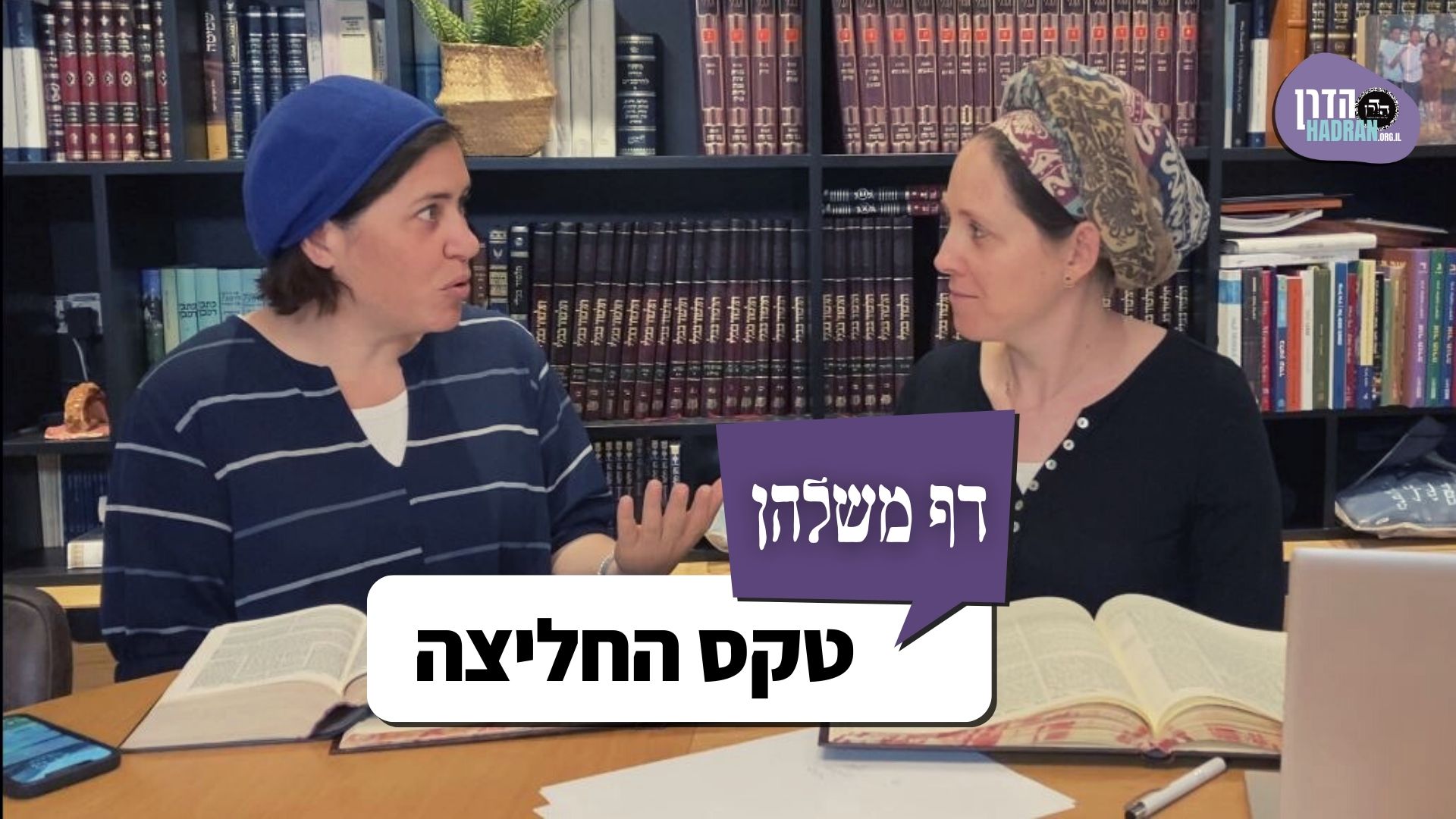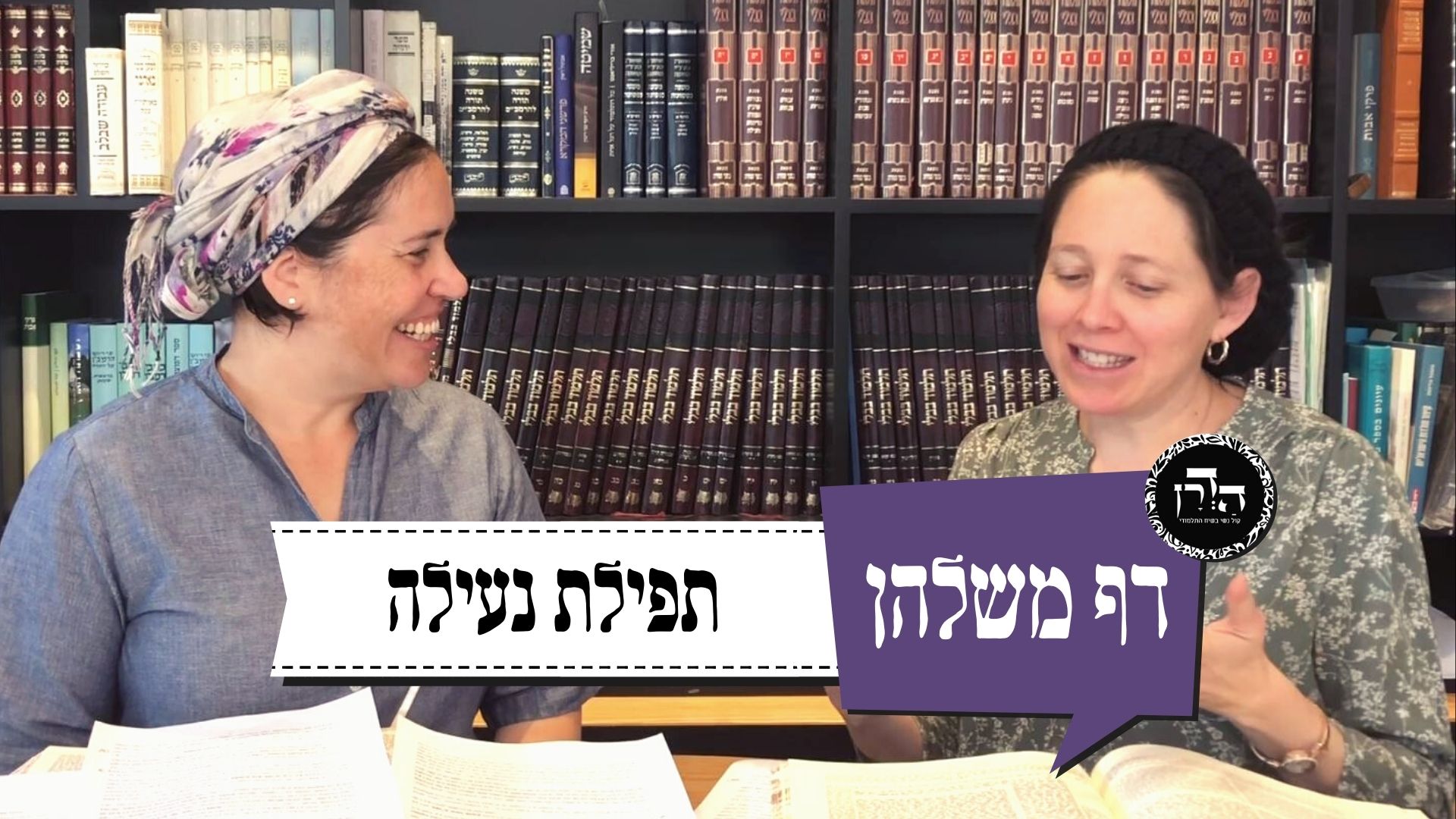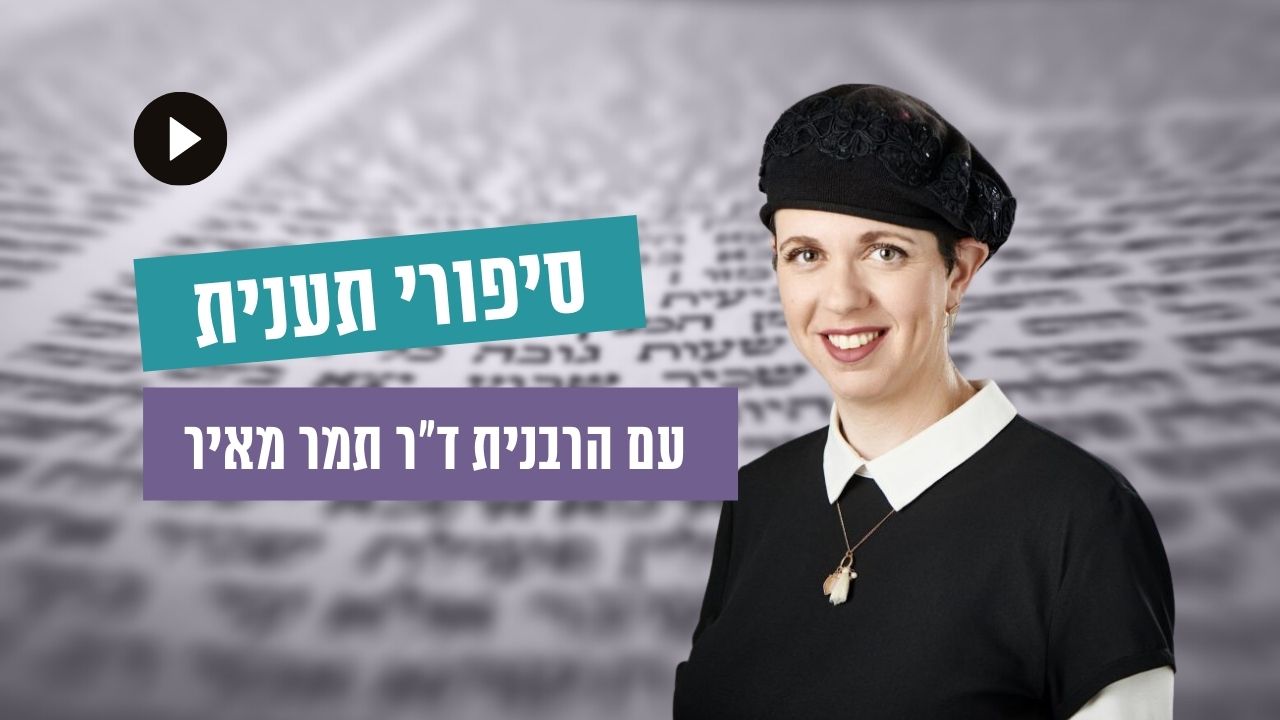יש שש דעות שונות לגבי המקור לכך שבשר בחלב אסור גם בהנאה וגם באכילה ולא רק בבישול כפי שכתוב בפשט הכתוב.
הלימוד השבוע מוקדש לזכות ולשלום הַיְימׇנוֹט אֱמוּנָה בַּת באנצ’י (קָסָאוּ) בת 11 שנעלמה במקום מגוריה בצפת, לפני שנתיים, ביום ט”ז אדר תשפ”ד (25.2.24), ולא נודעו עקבותיה.
הלימוד השבוע מוקדש למען ביטחון המדינה, החיילים והאזרחים, ולמען חירותו של העם האיראני. שנזכה בקרוב שיתקיים בנו הפסוק: "לַיְּהוּדִים הָיְתָה אוֹרָה וְשִׂמְחָה וְשָׂשֹׂן וִיקָר”.
הלימוד השבוע מוקדש לזכות וְלִשְׁלוֹם הָיימָנוֹט אֱמוּנָה בַּת באנצ’י (קָסָאוּ), בת 11 שנעלמה במקום מגוריה בצפת, לפני שנתיים, ביום ט”ז אדר תשפ״ד (25.2.24), ולא נודעו עקבותיה. אנו מתפללים שֶׁתִּמָּצֵא וְתוּשַׁב לביתה במהרה!
רוצה להקדיש שיעור?
כלים
הלימוד השבוע מוקדש לזכות ולשלום הַיְימׇנוֹט אֱמוּנָה בַּת באנצ’י (קָסָאוּ) בת 11 שנעלמה במקום מגוריה בצפת, לפני שנתיים, ביום ט”ז אדר תשפ”ד (25.2.24), ולא נודעו עקבותיה.
הלימוד השבוע מוקדש למען ביטחון המדינה, החיילים והאזרחים, ולמען חירותו של העם האיראני. שנזכה בקרוב שיתקיים בנו הפסוק: "לַיְּהוּדִים הָיְתָה אוֹרָה וְשִׂמְחָה וְשָׂשֹׂן וִיקָר”.
הלימוד השבוע מוקדש לזכות וְלִשְׁלוֹם הָיימָנוֹט אֱמוּנָה בַּת באנצ’י (קָסָאוּ), בת 11 שנעלמה במקום מגוריה בצפת, לפני שנתיים, ביום ט”ז אדר תשפ״ד (25.2.24), ולא נודעו עקבותיה. אנו מתפללים שֶׁתִּמָּצֵא וְתוּשַׁב לביתה במהרה!
כלים
העמקה
רוצה להבין מה באמת קורה מתחת לפני השטח של הסוגיה?
שיעורים, פודקאסטים והרחבות של מיטב המורות שלנו יפתחו לך עוד זוויות וכיווני חשיבה.
חדשה בלימוד הגמרא?
זה הדף הראשון שלך? איזו התרגשות עצומה! יש לנו בדיוק את התכנים והכלים שיעזרו לך לעשות את הצעדים הראשונים ללמידה בקצב וברמה שלך, כך תוכלי להרגיש בנוח גם בתוך הסוגיות המורכבות ומאתגרות.
פסיפס הלומדות שלנו
גלי את קהילת הלומדות שלנו, מגוון נשים, רקעים וסיפורים. כולן חלק מתנועה ומסע מרגש ועוצמתי.
חולין קטו
מעשה שבת ליתסרו דהא תיעבתי לך הוא
then let the product of an action that desecrates Shabbat, e.g., food cooked on Shabbat, be prohibited for consumption, as desecration of Shabbat is a practice of which God states: I have made it abominable to you, in that it is prohibited to cook on Shabbat. How can this food be prohibited only to the one who cooked it as a penalty by rabbinic law, but be permitted to others (see 15a)?
אמר קרא (שמות לא, יד) כי קדש היא לכם היא קדש ואין מעשיה קדש
The Gemara answers: A product of the desecration of Shabbat is an exception to the rule, as the verse states with regard to Shabbat: “For it is sacred to you” (Exodus 31:14). One may infer: It, Shabbat itself, is sacred, but the products of actions that desecrate it are not sacred, i.e., not prohibited.
חורש בשור ובחמור וחוסם פי פרה ודש בה ליתסרו דהא תיעבתי לך הוא
The Gemara raises another difficulty: If one plows with an ox and with a donkey together, thereby violating the prohibition in Deuteronomy 22:10, or if one muzzles the mouth of a cow and threshes with it, thereby violating the prohibition in Deuteronomy 25:4, the seeds or threshed grain should be prohibited for consumption according to the above principle, as these are both practices I have made abominable to you.
השתא ומה שבת דחמירא מעשיה מותרים הני לא כל שכן
The Gemara responds: Now that it has been established that products of desecration of Shabbat are permitted, one can derive the following using an a fortiori inference: Just as with regard to Shabbat, which is treated more stringently, the products of prohibited actions are permitted; is it not all the more so with regard to these prohibitions of plowing with an ox and a donkey and threshing with a muzzled animal, which are treated less stringently, that the products of prohibited actions should be permitted?
כלאי זרעים ליתסרו דהא תיעבתי לך הוא מדגלי רחמנא גבי כלאי הכרם (דברים כב, ט) פן תקדש פן תוקד אש מכלל דכלאי זרעים שרו
The Gemara challenges: Diverse kinds of seeds sown together should be prohibited for consumption, as this is a matter whose practice I have made abominable to you. The Gemara explains: One learns otherwise from the fact that the Merciful One revealed with regard to diverse kinds in a vineyard: “You shall not sow your vineyard with two kinds of seed; lest the growth of the seed that you will sow be forfeited [pen tikdash]” (Deuteronomy 22:9). The Sages read the phrase “be forfeited [pen tikdash]” as though it states: Lest it be burned [pen tukad esh], indicating that diverse kinds in a vineyard must be destroyed so that no benefit is derived from them. Since this is stated specifically with regard to a vineyard, one can conclude by inference that other diverse kinds of seeds are permitted.
ואימא כלאי כרם אסורין בין באכילה בין בהנאה כלאי זרעים באכילה אסירי בהנאה שרו איתקוש לכלאי בהמה דכתיב (ויקרא יט, יט) בהמתך לא תרביע כלאים שדך לא תזרע כלאים מה בהמתך היוצא ממנה מותרת אף שדך היוצא ממנו מותר
The Gemara objects: But say instead that the uniqueness of diverse kinds in a vineyard is that they are prohibited both for consumption and for benefit, whereas diverse kinds of seeds are prohibited for consumption but are permitted for benefit. The Gemara responds: One cannot say that diverse kinds of seeds are prohibited for consumption, as they are juxtaposed in the Torah to diverse kinds of animals, whose offspring are permitted. As it is written: “You shall not let your cattle mate with a diverse kind; you shall not sow your field with two kinds of seed” (Leviticus 19:19). The juxtaposition teaches that just as with regard to your cattle, the animal that comes from diverse species is permitted, so too, with regard to your field, that produce that comes from diverse seeds is permitted.
וכלאי בהמה גופייהו מנא לן מדאסר רחמנא כלאים לגבוה מכלל דלהדיוט שרי
The Gemara asks: And with regard to diverse kinds of animals themselves, from where do we derive that their offspring is permitted? The Gemara answers: From the fact that the Merciful One prohibits the offspring of diverse kinds of animals for sacrifice to the Most High upon the altar (see 38b), learn by inference that they are permitted to ordinary people for consumption.
אותו ואת בנו ליתסר מדאסר רחמנא מחוסר זמן לגבוה מכלל דלהדיוט שרי
The Gemara raises another difficulty: A mother and its offspring slaughtered on the same day should be prohibited for consumption, as this too is a practice made abominable. The Gemara answers: From the fact that the Merciful One prohibits an animal whose time has not yet arrived, i.e., that is less than eight days old, as an offering to the Most High (Leviticus 22:27), learn by inference that such animals are permitted to ordinary people for consumption. The offspring of a mother slaughtered that day is also considered an animal whose time has not yet arrived, since the prohibition against slaughtering it is limited to that day.
שילוח הקן ליתסר לא אמרה תורה שלח לתקלה
The Gemara raises a final difficulty: If one violated the mitzva that mandates sending away the mother bird from the nest, as it is stated: “You shall not take the mother with the young. You shall in any way let the mother go” (Deuteronomy 22:6–7), and the court instructed him to set the mother bird free, that mother bird should be prohibited to all, as this practice is also abominable. The Gemara responds: The Torah did not say: Send it away, if doing so could lead to a mishap. If the bird were prohibited, the Torah would not have commanded one to send it away, as others might eat it unwittingly.
אמר ריש לקיש מנין לבשר בחלב שאסור ת”ל (שמות יב, ט) אל תאכלו ממנו נא ובשל מבושל שאין תלמוד לומר מבושל מה תלמוד לומר מבושל לומר לך יש לך בשול אחר שהוא כזה ואי זה זה בשר בחלב
§ Reish Lakish says: From where is it derived that meat cooked in milk is prohibited for consumption? The verse states with regard to the Paschal offering: “You shall not eat it partially roasted, nor boiled in any way” (Exodus 12:9). As there is no need for the verse to state: “Boiled in any way,” since it could simply have stated: “Boiled.” What is the meaning when the verse states: “Boiled in any way?” It is included to tell you that there is another manner of cooking, the product of which is prohibited like this one. And which cooking is this? This is meat cooked in milk.
א”ל רבי יוחנן
Rabbi Yoḥanan said to Reish Lakish:
כעורה זו ששנה רבי לא תאכלנו בבשר בחלב הכתוב מדבר
Is that derivation that Rabbi Yehuda HaNasi taught ugly, that you derive a new one? The verse states with regard to an animal’s blood: “You shall not eat it; you shall pour it upon the earth as water” (Deuteronomy 12:24), and the next verse adds: “You shall not eat it; that it may go well with you, and with your children after you.” Rabbi Yehuda HaNasi teaches that the redundant second verse is not referring to the prohibition of blood. Rather, the verse is speaking of the prohibition of meat cooked in milk, teaching that it is prohibited for consumption.
אתה אומר בבשר בחלב הכתוב מדבר או אינו אלא באחד מכל האיסורין שבתורה אמרת צא ולמד מי”ג מדות שהתורה נדרשת בהן דבר הלמד מענינו במה הכתוב מדבר בשני מינין אף כאן בשני מינין
Do you say that the verse is speaking of the prohibition of meat cooked in milk? Or perhaps it is only referring to one of the other prohibitions in the Torah? You say: Go out and learn from the thirteen hermeneutical principles, one of which is: A matter that is derived from its context. To what are the adjacent verses referring? They are referring to consecrated animals that were redeemed, which are a combination of two types: They are non-sacred in that they may be eaten, but they are prohibited for shearing and work, like consecrated animals. Here too, one may conclude that the verse is referring to a prohibition that involves two types of food, i.e., the prohibition of meat cooked in milk.
אי מההיא הוה אמינא הני מילי באכילה אבל בהנאה לא קמ”ל
Reish Lakish replied to Rabbi Yoḥanan: My exposition is still necessary, since if the source for the prohibition of eating meat cooked in milk were from that verse cited by Rabbi Yehuda HaNasi alone, I would say that this statement applies only to the prohibition of eating meat cooked in milk, but not to that of deriving benefit from it. The verse cited with regard to the Paschal offering teaches us that even deriving benefit is prohibited, just as it is prohibited to derive benefit from a disqualified Paschal offering.
ורבי בהנאה מנא ליה נפקא ליה מהכא נאמר כאן (דברים יד, ב) כי עם קדוש אתה לה’ ונאמר להלן (דברים כג, יח) ולא יהיה קדש בבני ישראל מה להלן בהנאה אף כאן בהנאה
The Gemara asks: And Rabbi Yehuda HaNasi, from where does he derive that meat cooked in milk is prohibited for benefit? The Gemara responds: He derives it from here, as it is stated here: “For you are a sacred [kadosh] people unto the Lord your God. You shall not cook a kid in its mother’s milk” (Deuteronomy 14:21). And it is stated below: “Neither shall there be a sodomite [kadesh] of the sons of Israel” (Deuteronomy 23:18). The similar expressions teach that just as below, the prohibition of sodomy is a prohibition that involves enjoyment, i.e., deriving benefit, not eating, so too here, meat cooked in milk is prohibited with regard to deriving benefit.
דבי רבי אליעזר תנא (דברים יד, כא) לא תאכלו כל נבלה [וגו’] אמרה תורה כשתמכרנה לא תבשלנה ותמכרנה
The school of Rabbi Eliezer taught: The verse states: “You shall not eat of any animal carcass; you may give it to the stranger who is within your gates, that he may eat it; or you may sell it to a foreigner; for you are a sacred people to the Lord your God; you shall not cook a kid in its mother’s milk” (Deuteronomy 14:21). The Torah stated the prohibition of meat cooked in milk after the halakha of an animal carcass to teach that when you sell a carcass to a gentile, you shall not cook it in milk and then sell it, i.e., meat cooked in milk is prohibited for benefit and may not be sold.
דבי רבי ישמעאל תנא (שמות כג, יט) לא תבשל גדי בחלב אמו ג’ פעמים אחד לאיסור אכילה ואחד לאיסור הנאה ואחד לאיסור בשול
The school of Rabbi Yishmael taught: The Torah states three times: “You shall not cook a kid in its mother’s milk” (Exodus 23:19, 34:26; Deuteronomy 14:21). One verse serves to teach the prohibition against eating meat cooked in milk, and one serves to teach the prohibition against deriving benefit from it, and one serves to teach the prohibition against cooking meat in milk.
תניא איסי בן יהודה אומר מנין לבשר בחלב שאסור נאמר כאן (דברים יד, ב) כי עם קדוש אתה ונאמר להלן (שמות כב, ל) ואנשי קדש תהיון לי ובשר בשדה טרפה לא תאכלו מה להלן אסור אף כאן אסור
It is taught in a baraita: Isi ben Yehuda says: From where is it derived that it is prohibited to eat meat cooked in milk? It is stated here: “For you are a sacred people unto the Lord your God. You shall not cook a kid in its mother’s milk” (Deuteronomy 14:21). And it is stated below: “And you shall be sacred men unto Me; therefore you shall not eat any flesh that is torn of animals in the field [tereifa]; you shall cast it to the dogs” (Exodus 22:30). Just as below it is prohibited to eat a tereifa, so too here it is prohibited to eat meat cooked in milk.
ואין לי אלא באכילה בהנאה מנין אמרת ק”ו ומה ערלה שלא נעבדה בה עבירה אסורה בהנאה בשר בחלב שנעבדה בו עבירה אינו דין שאסור בהנאה
And from this I have derived only that it is prohibited for consumption. From where do I derive that it is prohibited for benefit as well? You can say it can be derived by an a fortiori inference: Just as with regard to the prohibition against eating the fruit of a tree during the first three years after its planting [orla], which is treated less stringently as no sin has been committed in the planting of the tree and its production of fruit, it is prohibited for benefit, is it not right that meat cooked in milk, with regard to which a sin has been committed, should be prohibited for benefit?
מה לערלה שכן לא היתה לה שעת הכושר
The Gemara rejects this, as orla exhibits a unique stringency: What is unique about orla? It is unique in that it never had a time when it was fit. The same cannot be said about meat and milk, which were each permitted on their own before being cooked together.
חמץ בפסח יוכיח שהיתה לו שעת הכושר ואסור בהנאה מה לחמץ בפסח שכן ענוש כרת
The Gemara suggests: Let leavened bread on Passover prove the point, as it had a time when it was fit, before Passover, and yet it is prohibited for benefit. The Gemara rejects this inference as well: What is unique about consumption of leavened bread on Passover? It is unique in that it is punishable by karet, unlike the prohibition of meat cooked in milk.
כלאי הכרם יוכיחו שאין ענוש כרת ואסור בהנאה
The Gemara comments: Let the prohibition of diverse kinds in a vineyard prove the point, as it is not punishable by karet, and yet it is prohibited to derive benefit from the product.
למה לי גז”ש לייתי כולה בק”ו מערלה ומה ערלה שלא נעבדה בה עבירה אסורה בין באכילה בין בהנאה בשר בחלב שנעבדה בו עבירה אינו דין שאסור בין באכילה בין בהנאה
The Gemara asks: Why do I need both Isi ben Yehuda’s verbal analogy to teach the prohibition of consumption and the a fortiori inference to teach the prohibition of benefit? Let all of it, both the prohibition of consumption and the prohibition against deriving benefit, be derived by an a fortiori inference from orla: Just as orla, which is treated less stringently, as no sin has been committed in the tree’s planting, is nevertheless prohibited both for consumption and for benefit; is it not right that meat cooked in milk, with regard to which a sin has been committed, should be prohibited both for consumption and for benefit?
משום דאיכא למימר חורש בשור ובחמור וחוסם פי פרה ודש בה יוכיח שנעבדה בהם עבירה ושרו
The Gemara responds: That inference would be invalid because one could say: The cases of one who plows with an ox and with a donkey, and one who muzzles the mouth of a cow and threshes with it prove it invalid. As in those cases, a sin has been committed through them, and yet benefit from the products of these actions is permitted. One cannot refute a verbal analogy with logical reasoning.
למה לי למימר כלאי הכרם יוכיחו לימא ערלה תוכיח וליהדר דינא וליתי במה הצד
The Gemara asks further: Why do I need to say, as was stated above, that the case of diverse kinds in a vineyard proves that benefit from meat and milk is prohibited? At that point, two other cases, orla and leavened bread on Passover, had already been offered as proof. Although they were rejected because they both possess a unique stringency, each lacks the stringency possessed by the other. Therefore, let us say that the case of orla proves that the stringency for consumption of leavened bread on Passover, i.e., the penalty of karet, is irrelevant, and vice versa. And let the inference revert to its starting point, and let the halakha with regard to meat cooked in milk be derived by analogy from the common element of the two sources, i.e., the prohibition against both consumption and benefit.
אמר רב אשי משום דאיכא למימר נבלה תוכיח שאסורה באכילה ומותרת בהנאה
Rav Ashi said: Such a derivation cannot be suggested, because one can say that the case of an unslaughtered animal carcass proves it invalid, as an animal carcass is prohibited for consumption and yet it is permitted for benefit.
אמר ליה רב מרדכי לרב אשי הכי אמרינן משמיה דריש לקיש כל מה הצד מגופו פרכינן מעלמא לא פרכינן
Rav Mordekhai said to Rav Ashi: We say in the name of Reish Lakish as follows: For any analogy derived from the common element of two sources, one can refute the analogy only by invoking conflicting details of the two sources themselves, e.g., here, some stringency shared by orla and leavened bread, but not by meat cooked in milk. One cannot refute the analogy from an external case, as you do.
אי הכי תיתי במה הצד משום דאיכא למיפרך מה להצד השוה שבהן שכן גדולי קרקע
The Gemara asks: If so, then the question remains: Why not let the halakha be derived by analogy from the common element of orla and leavened bread on Passover? The Gemara responds: Because the analogy can be refuted as follows: What is unique about the common element of orla and leavened bread? It is unique in that they both involve produce that grows from the ground, whereas meat and milk do not grow from the ground.
אי הכי השתא נמי איכא למיפרך מה לכלאי הכרם שכן גדולי קרקע
The Gemara counters: If so, then even now that the Gemara has invoked diverse kinds in a vineyard to prove the point, the derivation can be refuted in the same manner: What is unique about the prohibition of diverse kinds in a vineyard? It is unique in that it involves produce that grows from the ground.
א”ל רב מרדכי לרב אשי הכי אמרינן משמיה דר”ל כל מה הצד פרכינן כל דהו לא אם אמרת (חדא מחדא) קל וחומר פרכינן כל דהו לא פרכינן
Rav Mordekhai said to Rav Ashi: We say in the name of Reish Lakish as follows: For any analogy derived from the common element of two sources, one can refute the analogy by invoking any factor shared by the two source cases but not by the target case. But this is insufficient to refute an analogy to a single source from a single source using the standard formulation: No, if you say the halakha applies to the source case, which possesses a unique factor X, must you say the same of the target case, which does not? One can refute such analogies using this formulation only by way of an a fortiori inference, i.e., if the unique factor X is a stringency. But one cannot refute it by simply mentioning any unique factor, e.g., that diverse kinds in a vineyard grow from the ground.
וליפרוך לכולהו מה לכולהו שכן גדולי קרקע
The Gemara counters: But one need not invoke the case of diverse kinds in a vineyard by itself, since it is invoked in addition to the cases of orla and leavened bread. Consequently, this is effectively a derivation from the common element of all three sources, not from one single case to another. If so, let us refute the derivation from all of them: What is unique about all of the cases? They are unique in that they involve produce that grows from the ground.
אלא אמר ליה רב מרדכי לרב אשי הכי אמרינן משמיה דר”ל
Rather, Rav Mordekhai said to Rav Ashi: We say in the name of Reish Lakish as follows:

